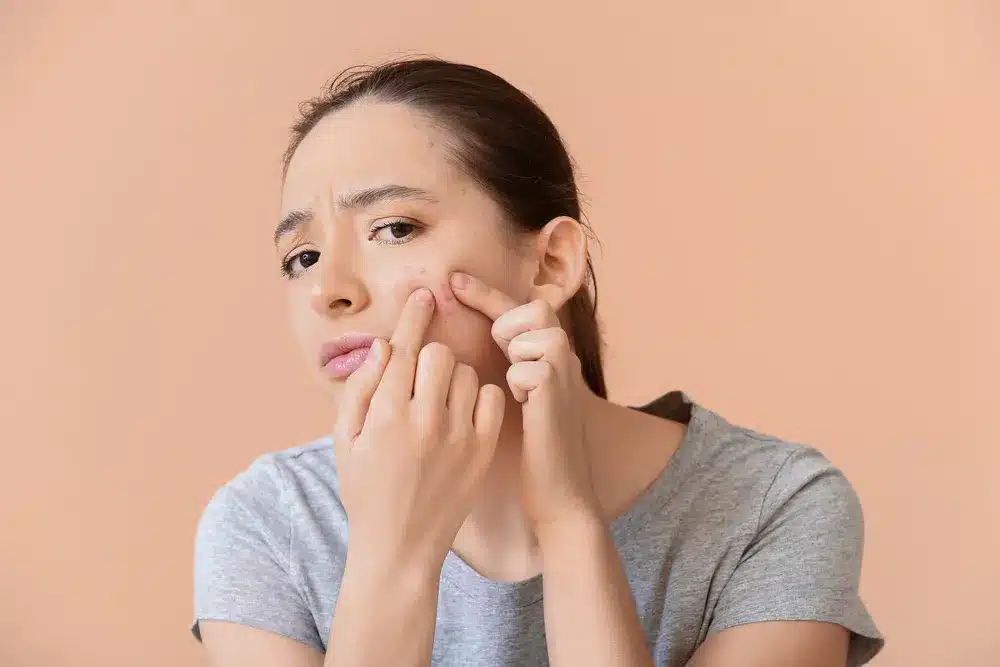Acne, a common skin condition affecting millions worldwide, isn’t limited to adolescence but can impact people of all ages, often affecting self-confidence. This comprehensive guide explores acne’s causes, treatments, and potential cures, while addressing frequently asked questions about both medical and natural remedies.
Understanding Acne
As one of the most prevalent skin conditions globally, acne varies from mild to severe cases, significantly impacting self-esteem and quality of life. While not medically dangerous, acne can be frustrating to manage. With proper treatment and consistent care, most individuals can achieve clearer, healthier skin.
Root Causes of Acne
Acne develops when hair follicles become clogged with excess oil (sebum), dead skin cells, and bacteria. While sebum naturally protects and moisturizes skin, overproduction can combine with dead cells to block follicles. Bacterial infection of these blockages leads to various acne lesions including blackheads, whiteheads, and inflammatory blemishes.
Genetic Factors in Acne
Research indicates acne often runs in families. If parents experienced acne, their children have higher susceptibility, though the specific genetic mechanisms involving sebum production, skin inflammation, and immune responses remain under study.
Is Acne Curable?
Acne treatment focuses on reducing lesions and improving skin appearance rather than offering a universal cure. Effectiveness varies by individual, depending on acne severity and underlying causes.
Challenges in Treating Acne
Treating acne requires patience as responses vary between individuals. Teenagers may see natural improvement as hormones stabilize, while others may need ongoing management to control breakouts.
Age-Specific Treatment Approaches
Treatment strategies differ for adolescents and adults. Teen acne typically relates to puberty’s hormonal changes that stimulate excess sebum production, while adult acne may have different triggers requiring alternative approaches.
Managing Severe Acne
Severe acne management requires a comprehensive approach:
- Consult a dermatologist for personalized treatment
- Establish a consistent skincare routine
- Consider prescription treatments like Tretinoin
- Maintain proper hygiene practices
- Implement stress-reduction techniques
Comprehensive Acne Treatment Options
Explore answers to common questions about various acne treatment methods.
Nutrition and Lifestyle Approaches
Green Tea for Acne
Green tea’s antioxidants and anti-inflammatory compounds may help reduce acne visibility by protecting skin and decreasing inflammation.
Honey’s Antibacterial Benefits
Natural honey combats acne-causing bacteria through its antimicrobial properties while reducing inflammation.
Dairy and Acne Connection
Some evidence suggests dairy hormones may stimulate oil production, potentially worsening acne, though more research is needed to confirm this relationship.
Low Glycemic Diet Benefits
Low GI diets may reduce acne severity by stabilizing blood sugar and insulin levels, subsequently decreasing sebum production.
Exercise and Skin Health
While exercise benefits overall health, its direct acne impact is unclear. It may help manage stress (an acne contributor) but excessive sweating could potentially trigger breakouts.

Natural Remedies
Effectiveness of Home Treatments
Various natural remedies can help manage acne symptoms, though effectiveness varies by individual. Finding the right solution often requires experimentation.
Apple Cider Vinegar Application
Diluted apple cider vinegar may combat acne bacteria due to antimicrobial properties, but its acidity requires careful dilution to prevent skin irritation.
Tea Tree Oil Benefits
Tea tree oil’s antibacterial and anti-inflammatory properties make it potentially effective against acne when properly diluted with a carrier oil.
Witch Hazel Uses
Witch hazel can unclog pores, remove excess oil, and reduce acne visibility while potentially inhibiting bacterial growth due to its anti-inflammatory properties.
Aloe Vera Applications
Aloe vera helps reduce acne-related redness and swelling while promoting healing and minimizing scarring.
Baker’s Yeast Considerations
Limited evidence suggests baker’s yeast (rich in nutrients) might benefit skin health, though overuse could cause irritation.
Nutritional Supplements
Fish Oil Benefits
Omega-3 fatty acids in fish oil may reduce acne-related inflammation and support overall skin health.
Zinc Supplementation
Preliminary research suggests zinc (essential for skin health and immunity) might help alleviate acne symptoms.
Skin Care Practices
Stress Management
Reducing stress may decrease acne severity by lowering hormone-induced oil production that clogs pores.
Proper Exfoliation
Gentle exfoliation helps remove dead skin cells and unclog pores, though harsh scrubbing can worsen acne.
Makeup Selection
Non-comedogenic, oil-free makeup products minimize pore clogging and skin irritation, helping prevent new breakouts.
Avoiding Picking
Resisting the urge to pick acne prevents worsened inflammation, scarring, and bacterial spread that causes new breakouts.
Moisturizer Selection
Non-comedogenic moisturizers hydrate without clogging pores, though finding the right product may require experimentation.
Medical Treatments
Prescription Options at MedsBase
MedsBase provides various acne treatments including topical Tretinoin and oral antibiotics like Lymecycline and Oxytetracycline. Always consult a healthcare professional before using prescription acne medications.
Tretinoin Mechanism
This retinoid accelerates skin cell turnover, unclogs pores, and may stimulate collagen production for smoother skin.
Lymecycline Function
This antibiotic controls acne by inhibiting bacterial growth and reducing inflammation.
Oxytetracycline Action
Similar to Lymecycline, this antibiotic reduces acne-causing bacteria and associated inflammation.
Treclin Gel Benefits
This combination product uses tretinoin to enhance cell turnover while its antibiotic component controls bacterial growth.
Acnecide Gel Effectiveness
Containing benzoyl peroxide, this treatment exfoliates skin to remove blockages while combating sebum-feeding bacteria.
Addressing Acne Scars
Treating acne scars often requires combination approaches including medications, peels, microneedling, or fillers to improve appearance.
Acne Dysmorphic Disorder
This psychological condition involves obsessive focus on perceived skin imperfections, often leading to compulsive picking that worsens acne and causes scarring.
Emotional Support Resources
Acne sufferers can access support through:
- Online counseling and support groups
- Confiding in trusted friends/family
- Mindfulness and meditation practices
- Professional therapy services
When to Seek Professional Help
If over-the-counter treatments prove ineffective, consulting a dermatologist can provide specialized treatment options and deeper understanding of your specific acne condition.
References:
https://www.nhs.uk/conditions/acne/treatment/
https://www.healthline.com/nutrition/13-acne-remedies
https://www.glamourmagazine.co.uk/gallery/best-acne-treatment
https://www.mayoclinic.org/diseases-conditions/acne/diagnosis-treatment/drc-20368048
https://www.nhsinform.scot/illnesses-and-conditions/skin-hair-and-nails/acne#treating-acne
https://www.hollandandbarrett.com/the-health-hub/conditions/skin-health/acne/six-ways-clear-acne/







